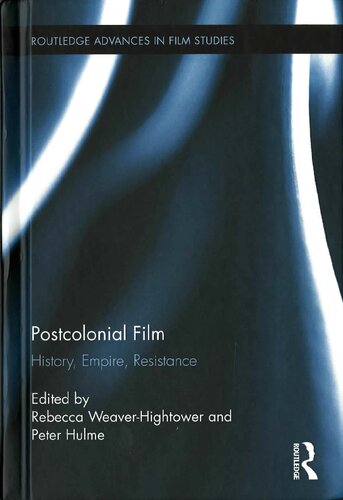

Most ebook files are in PDF format, so you can easily read them using various software such as Foxit Reader or directly on the Google Chrome browser.
Some ebook files are released by publishers in other formats such as .awz, .mobi, .epub, .fb2, etc. You may need to install specific software to read these formats on mobile/PC, such as Calibre.
Please read the tutorial at this link: https://ebookbell.com/faq
We offer FREE conversion to the popular formats you request; however, this may take some time. Therefore, right after payment, please email us, and we will try to provide the service as quickly as possible.
For some exceptional file formats or broken links (if any), please refrain from opening any disputes. Instead, email us first, and we will try to assist within a maximum of 6 hours.
EbookBell Team

0.0
0 reviewsTowards the century¿s end and at the dawn of the new millennium, film continues to form a site for interrogating colonization and decolonization, though against a backdrop that is now more neo-colonial than colonial and more culturally imperial than imperial.
This volume explores how individual films emerged from and commented on postcolonial spaces and the building and breaking down of the European empire. Each chapter is a case study examining how a particular film from a postcolonial nation emerges from and reflects that nation's unique postcolonial situation. This analysis of one nation's struggle with its coloniality allows each essay to investigate just what it means to be postcolonial.
Introduction: New Perspectives on Postcolonial Film Rebecca Weaver-Hightower Part I: New Readings of Twentieth Century Anti-Colonial Resistance Narratives 1. Yesterday's Mujahiddin: Gillo Pontecorvo's The Battle of Algiers (1966) Nicholas Harrison 2. The Sound of Broken Memory: Assia Djebar's The Nuba of the Women of Mount Chenoua (1977) Sarah E. Mosher 3. Approximate Others: Peter Weir's The Last Wave (1977) Jerod Ra'Del Hollyfield 4. Life as an Ocean: Hou Hsiao-hsien's The Puppetmaster (1993) Stephen Spence Part II: Millennial Tropes of NeoEmpire 5. Shifting Sands, Imaginary Space, and National Identity: Cedric Klapisch's Peut-etre (1999) Jehanne-Marie Gavarini 6. No Chains on Feet or Mind: Jean-Claude Flamand Barny's Neg Maron (2005) Meredith Robinson 7. A Cinema of Conviviality: Ray Lawrence's Jindabyne (2006) Corinn Columpar 8. Deja vu All Over Again: Guy Maddin's My Winnipeg (2007) Cynthia Sugars Part III: New Imaginations of Neo-Postcolonialism 9. Identity and The Politics of Space: Fatih Akin's The Edge of Heaven (2007) Vuslat Demirkoparan 10. Space and Cultural Memory: Te-Shen Wei's Cape No.7 (2008) Yu-wen Fu 11. The Postcolonial Hybrid: Neill Blomkamp's District 9 (2009) Rebecca Weaver-Hightower 12. The Marginal Interventionist Cinema of Budhan Theatre: Dakxin Bajrange Chhara's The Lost Water (2008/2010) Henry Schwarz 13. Afterword: History, Empire, Resistance Ella Shohat and Robert Stam